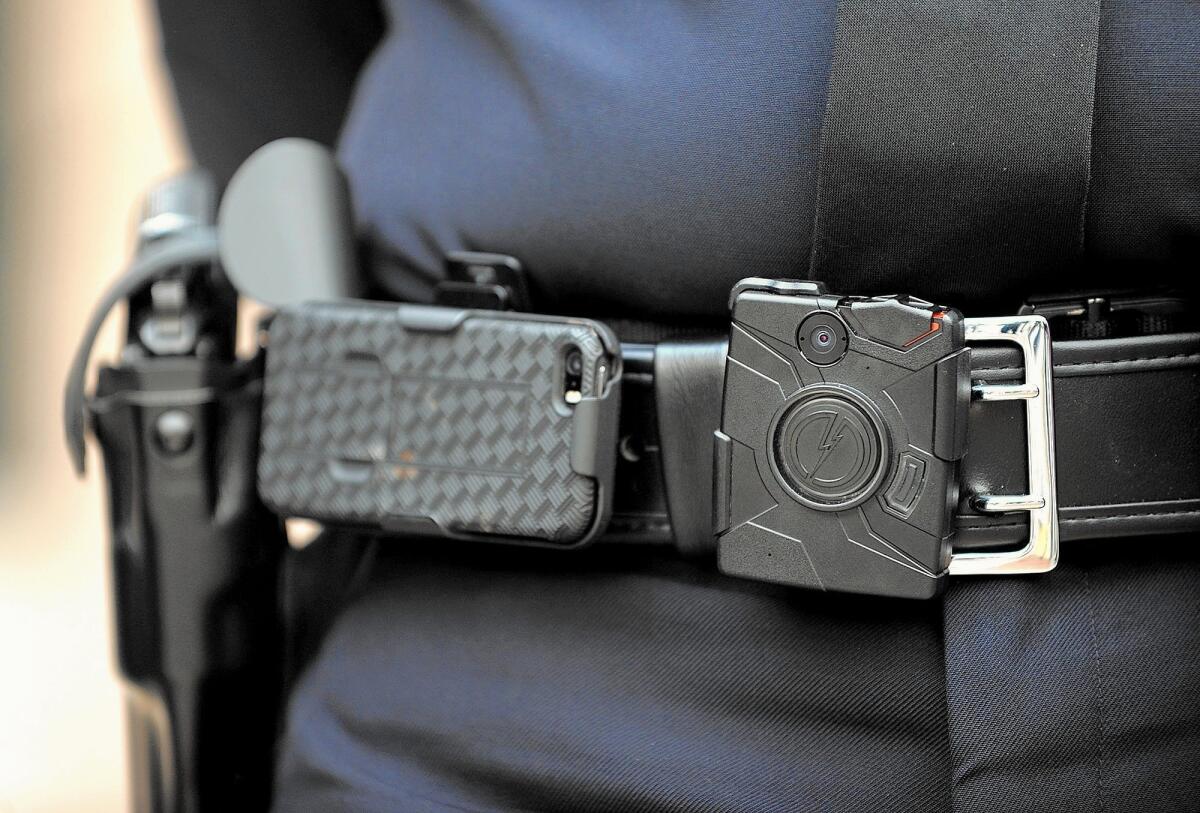Brown signs legislation to protect minorities from racial profiling and excessive force

Reporting from Sacramento — In the wake of national public anger over killings by police in New York, Ferguson, Mo., and elsewhere, landmark California legislation to protect minorities from racial profiling and excessive force won Gov. Jerry Brown’s signature Saturday.
At the same time, the governor issued a blunt warning against the proliferation of laws criminalizing behavior as he rejected a trio of proposals intended to bar the misuse of unmanned drones.
In a forceful veto message, Brown said lawmakers were unnecessarily complicating California’s criminal code, which he said had grown to more than 5,000 provisions “covering every conceivable form of human misbehavior.”
Interested in campaigns and governing? Sign up for the free Essential Politics newsletter >>
“During the same period, our jail and prison populations have exploded,” Brown wrote. “Before we keep going down this road, I think we should pause and reflect how our system of criminal justice could be made more human, more just and more cost-effective.”
The profiling legislation the governor approved was a response to “the deaths of unarmed black men and other people of color by police,” said the author, Assemblywoman Shirley N. Weber (D-San Diego). Such incidents “have forced us to confront some ugly truths about the persistence of racial bias in law enforcement,” she said.
Her measures have spawned vigils by dozens of activists from groups including the Communities United Coalition, supporters of the “Black Lives Matter” movement, outside Brown’s office in recent days. That movement grew out of the fatal shooting of an unarmed black man by a white police officer in Ferguson last year.
Under the new laws, California police must collect data on the people they stop, including perceived race and ethnicity, the reason for the encounter and the outcome. Law enforcement agencies will also be required to issue detailed annual reports on all cases in which officers use force that results in serious injury or death.
The state attorney general’s office will determine how the reporting is done and how the data are stored.
In addition, police agencies whose officers wear cameras will have to follow rules on storing and using the video so it is not mishandled. The regulations dictate how long video should be kept and how supervisors should use it in investigations.
State rules on the falsifying and withholding of evidence by authorities also will be tighter.
Those measures and others Brown signed will “strengthen criminal justice in California,” said a statement from his office.
Jerron Jordan, an activist with the group LA Voice-PICO, welcomed the new laws, which take effect Jan. 1.
“These are historic times we are living in,” he said in an email. “I applaud the efforts of all of those who worked tirelessly to pass this bill and especially to the families who lost loved ones due to police violence. I am glad that our governor had the moral courage to sign our bill.”
But David Bejarano, president of the California Police Chiefs Assn., found Brown’s action “disappointing.” His group had concerns about the cost and burden of collecting so much data.
“There is no proven information that this reduces or prevents racial profiling,” said Bejarano, chief of the Chula Vista Police Department. “It’s a huge amount of data collected without any consequence.”
Amador County Sheriff Martin Ryan said Brown called him Saturday and talked with him for half an hour about why he was signing the bill. The governor felt something needed to be done, said Ryan, president of the California State Sheriffs Assn.
But the data will lack context, Ryan said, and proponents of the new law simply favor “information to help them reach a conclusion that they have already reached.”
The data collection does not have to begin until March 1, 2018, to allow time for a system setup.
Brown vetoed nine bills Saturday that he said would have criminalized misconduct already covered by existing laws, including measures that would have prohibited civilians from flying aerial drones over wildfires, schools, prisons and jails.
Those and other proposals he rejected would have created new crimes or penalties for misconduct including using bullhooks to handle elephants, allowing explosions in drug labs and removing GPS tracking devices from paroled sex offenders.
Many of them amounted to “a novel way to characterize and criminalize conduct that is already proscribed,” Brown wrote in a veto message. “This multiplication and particularization of criminal behavior creates increasing complexity without commensurate benefit.”
One bill would have set steep penalties for hobbyists flying drones above wildfires and other emergency sites and given emergency responders immunity from liability for damage caused to drones that they knocked out of the air.
The head of the state Department of Forestry and Fire Protection had complained that drones flew over a dozen wildfires this summer, grounding firefighting aircraft in some cases to avoid midair collisions.
State Sen. Ted Gaines (R-Rocklin), author of the three drone bills, posted his disappointment on Twitter, saying, “Our laws must keep up w/growing drone tech or else all of our safety is at risk.”
Brown also used his veto pen on a measure that would have prohibited those who steal a firearm, buy a stolen one or bring ammunition onto school grounds from owning a firearm for 10 years. California voters made theft of most firearms a misdemeanor last year when they passed Proposition 47.
Twitter: @mcgreevy99
Times staff writer Paige St. John contributed to this report.
Hoy: Léa esta historia en español
More to Read
Sign up for Essential California
The most important California stories and recommendations in your inbox every morning.
You may occasionally receive promotional content from the Los Angeles Times.











